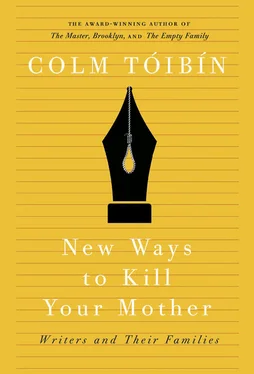In the early years he was coy about sex. In a diary entry for 1979 he disclosed: ‘Such was the Puritanism imposed by Edwina [his mother] that I did not masturbate till the age of Twenty-Six, then not with my hands but by rubbing my groin against my bed-sheets, while recalling the incredible grace and beauty of a boy-diver plunging naked from the high board in the swimmingpool of Washington U. in Saint Louis.’ The work he produced seemed almost part of a self-disgust, or a desperate need to overcome it, an aspect of pure frustration with himself and his circumstances. On 15 April 1936, for example, he wrote:
It’s a horrible hot afternoon and I have that horrible oppressed feeling that hot weather gives me. This house frightens me again. I feel trapped — shut in. The radio is on — that awful ball-game — it will be going every afternoon now and hearing it makes me sick — I’m too tired to write — Can do nothing — I am disgusted with the story I wrote Saturday… It seems idiotic to me now… I wish I could write something decent — strong — but everything about me is weak — and silly — Terrible to feel like this.
The feeling of uselessness arose sometimes from his fears about his masculinity, the sense that he was a sissy, a guy without guts, as much as from his judgements on the badness of his work. Two weeks after the entry quoted above, he wrote: ‘I must remember that my ancestors fought the Indians! No, I must remember that I am a man — when all is said and done — and not a snivelling baby.’ And then on 8 May: ‘If only I could realize I am not 2 persons. I am only one. There is no sense in this division. An enemy inside myself! How absurd!’ Later that year, it struck him about Shakespeare: ‘I bet he was a guy that had plenty of guts. No damn sissy.’ The following year, he wrote: ‘But if I were God I would feel a little bit sorry for Tom [Tennessee] Williams once in a while — he doesn’t have a very gay easy time of it and he does have guts of a sort even though he is a stinking sissy!’
In the middle of all of this Williams was capable of what one presumes — it is hard to know — was irony, even self-mockery, when in April 1940 in New York he noticed the war: ‘Tonight Germany seized Denmark and war was declared by Norway — but infinitely more important is the fact that my play will be discussed and perhaps a decision rendered by the Theatre Guild.’
As he moved away from home, Williams fell in love a number of times, first with a Canadian, Kip Kiernan, then with Pancho Rodriguez, and then Frank Merlo, with whom he lived for many years, but this did not prevent him from having many casual lovers, often one or two a day wherever he went. On 27 June 1941, he wrote: ‘I am fatigued, I am dull, I am bitter at heart. But I do not suffer much. I have diverted myself with the most extraordinary amount of sexual license I have ever indulged in.’
This sexual licence, however, was accompanied by strange moments of unease about his sexuality and about homosexuality in general. When in 1941 a friend suggested that homosexuals should be exterminated at twenty-five ‘for the good of society’, Williams wondered:
How many of us feel that way, I wonder? Bear this intolerable burden of guilt? To feel some humiliation and a great deal of sorrow at times is inevitable. But feeling guilty is foolish. I am a deeper and warmer and kinder man for my deviation. More conscious of need in others, and what power I have to express the human heart must be in large part due to this circumstance. Some day society will take perhaps the suitable action — but I do not believe that it will or should be extermination.
And sex itself much of the time, despite the energy he put into it, disappointed him. On 16 September 1941, he wrote, for example: ‘The cold and beautiful bodies of the young! They spread themselves out like a banquet table, you dine voraciously and afterwards it is like you had eaten nothing but air.’
As he got older and began to travel, especially in Italy and Spain where he went every summer, he paid for sex, but this did not seem to make him happy either, especially afterwards. In Rome in July 1955 he wrote:
The most embarrassing of all relations is with a whore. At least, after the act, when you suffer the post-orgasmic withdrawal anyway, a good whore, in the sense of a really wise one, knows how to create an atmosphere that obviates this hazard but the one this afternoon, though divinely gifted in the practise of bed, made me feel very sheepish afterwards. I didn’t know how to offer the money or how to say goodbye. It is because of my Puritanical feeling that it is wrong, wrong! — to use another being’s body like this because of having need, on one hand, and cash on the other — Still — I owe more pleasure to this circumstance in life than anything else, I guess. Can I complain? Breast beating is twice as false as the love of any whore.
Because of his bad eyesight, Williams did not serve in the Second World War and it is an aspect of his honesty as well as his self-obsession that the war engaged him very little. In January 1942 he wrote:
I am frightened thinking of the changes or rather the increased vicissitudes the war may create in my life. I suppose if it did not affect me personally my feelings about it would be only abstractly regretful. Things have to impinge on my own life to matter to me very much. Is it that way with most people? Yes, I am sure that it is.
He had, as he said, a way of reducing or indeed elevating everything to the personal. In a letter to Elia Kazan about Nixon in August 1952, for example: ‘He looks like the gradeschool bully that used to wait for me behind a broken fence and twist my ear to make me say obscene things.’
What impinged on Williams’s life as much as his work, as is clear from these pages, was his family. His father appeared in the early entries as a threat and a nuisance, ‘a dormant volcano’; his younger brother Dakin hardly at all; his mother Edwina surprisingly little. But his maternal grandparents, whom he loved, were invoked regularly. His grandmother, also called Rose, was, he wrote in 1941, ‘a miracle of gentleness. A faded golden rose in fading sunlight. The finest thing in my life.’ And the fate of his sister Rose troubled him year after year, flitting through his waking life and his dreams. As he worked with fierce determination on his plays, as he travelled the world like a maniac, as he sought new sexual partners, as he drank and took pills and went to parties, there was always the sense, made clear in many notebook entries, that he was in flight from what was done to his sister. He lived in the shadow of her suffering and there were times when he seemed to seek pleasure and experience enough for two of them.
Rose was sixteen months older than Williams; as children, they were very close. She saw her first psychiatrist when she was twenty-one. In 1937 she was diagnosed with dementia praecox, an early term for schizophrenia. In 1943 she underwent a pre-frontal lobotomy. In notes made in 1979 Williams wrote that his mother ‘approved for my sister to have one of the first pre-frontal lobotomies performed in the States because she was shocked by Rose’s tastefully phrased but explicit disclosures of masturbation practised with Candles stolen from the Chapel, at All Saints in Vicksburg’. Rose lived in institutions from 1943 for the rest of her life.
As Margaret Bradham Thornton makes clear in her copious annotations to these diaries — each right-hand page of Williams’s entries is faced by a left-hand page of informative notes — Rose appeared in various guises in many of Williams’s plays, poems and stories. Her life as it made its way into his imagination is central to his work.
In October 1936 Williams first noted a problem with Rose: ‘The house is wretched. Rose is on one of her neurotic sprees — fancies herself an invalid — talks in a silly dying-off way — trails around the house in negligees. Disgusting.’ Three years later, when the seriousness of her condition was fully clear, Williams wrote an emendation to this: ‘God forgive me for this!’ In January 1937 Williams’s mother wrote to her parents about Rose’s breakdown and her ‘raving on the subject of “sex”… and I was ashamed for Dakin and Tom to hear her the other night’. The same day Williams wrote in his notebook: ‘Tragedy. I write that word knowing the full meaning of it. We have had no deaths in our family but slowly by degrees something was happening much uglier and more terrible than death. Now we are forced to see it, know it. The thought is an aching numbness — a horror!’
Читать дальше












